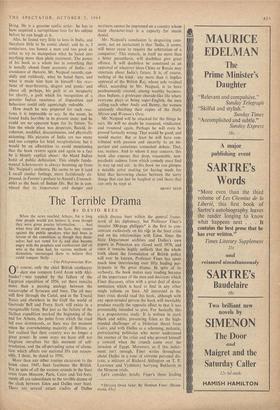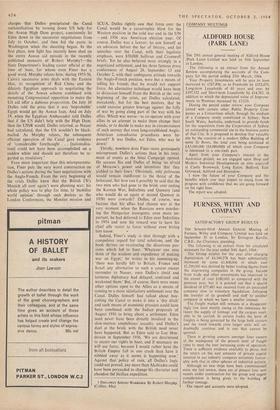The Terrible Drama
BY DAVID REES When the news reached Athens, for a long time people would not believe it, even though they were given precise information... . . And when they did recognise the facts, they turned against the public speakers who had been in favour of the expedition, as though they them- selves had not voted for it, and also became angry with the prophets and soothsayers and all who at the time had, by various methods of divination, encouraged them to believe they could conquer Sicily. . . .
—Tire Peloponnesian War,
(AF course, only the chief British soothsayer kf —dare one compare Lord Avon with Alci- biades?—was toppled by the failure of the Egyptian expedition of 1956, yet there remains more than a passing analogy between the catastrophe of Syracuse and Suez. The oil may still flow through the Canal, and in the Trucial States and elsewhere in the Gulf the world of. Gertrude' Bell and Freya Stark still exists in a recognisable form. But just as the failure of the Sicilian expedition marked the beginning of the end for Athens, the point from which the road led ever downwards, so Suez was the moment when the overwhelming majority of Britons at last realised that their country was no longer a great power. In some ways we have still not forgiven ourselves for this moment of self- revelation, and the all-pervading sense of aliena- tion which affects our national life can reason- ably, I think, be dated to 1956.
More than any other routine excursion to the brink since 1945, Suez fascinates the British. Yet in spite of all the various strands in the Suez crisis from Moscow, Paris, Cairo and Tel-Aviv, surely all are subordinate to the terrible drama of the clash between Eden and Dulles over Suez. There are several extant studies of Dulles
which discuss Suez within the general frame- work of his diplomacy, but Professor Finer's massive 500-page philippic* is the first to con- centrate exclusively on his rOje in the Suez crisis and on his relationships with Eden. Since the State Department archives and Dulles's own papers in Princeton are closed until 1970, and since it remains highly unlikely that the whole truth about the formulation of British policy will ever be known, Professor Finer has spent much time interviewing over fifty leading par- ticipants in the great drama. In spite of its verbosity, the book makes easy reading because of the importance of the men and decisions which Finer discusses, often with a great deal of docu- mentation which is hard to find in any other single volume on Suez. All interested in the Suez crisis should read this book, although with any open-minded person the book will inevitably produce exactly the opposite effect to that it was presumably intended to give. For basically this is a preposterous study. It is written in stark black and white, presenting Eden as the high- minded challenger of a Hitlerian threat from Cairo, and with Dulles as a scheming, pedantic, prevaricating politician who never understood the essence of the crisis and who proved himself a coward when the crunch came over the invasion of Egypt. Moreover, as if this indict- ment isn't enough, Finer writes throughout about Dulles in a tone of extreme personal dis- taste, a mixture of Richard Aldington on T. E. Lawrence and Vyshinsky harrying Bukharin in the Moscow trials.
Let's consider briefly Finer's three leading
* DULLES OVER Suez. By Henman Finer. (Heine- mann, 63s.) charges that Dulles precipitated the Canal nationalisation by turning down US help for the Aswan High Dam project, consistently let Eden down in the successive negotiations from July to October, and then led the panic in Washington when the shooting began. In the first place, new light has recently been shed on the entire Aswan aid episode in the recently published memoirs of Robert Murphy]'—the State Department's leading career official at the time of Suez, for whom even Finer has a good word. Murphy relates how, during 1955-56, Cairo's successive arms deals with the Eastern bloc, its recognition of Red China and the dilatory Egyptian approach to negotiating the details of the Aswan scheme combined with mounting Congressional opposition to make the US aid offer a dubious proposition. On July 10 Dulles told the press that it was 'improbable' Egypt would get the Aswan loan. And on July 19, when the Egyptian Ambassador told Dulles that if the US didn't help with the High Dam, then the USSR would, Dulles retorted, as Nasser had calculated, that the US wouldn't be black- mailed. As Murphy relates, the subsequent efficient operation of the Canal gave evidence of 'considerable forethought . . . [nationalisa- tion] could not have been accomplished on a sudden whim and should not therefore be re- garded as retaliatory.'
Even more important than this misrepresenta- tion, Finer puts the very worst construction on Dulles's actions during the Suez negotiations with the Anglo-French. From the very beginning of the crisis Dulles knew that the British (It's Munich all over again') were planning war; his whole policy was to play for time, to 'mobilise world opinion' through such devices as the London Conferences, the Menzies mission and SCUA. Dulles rightly saw that force over the Canal would be a catastrophic blow for the Western position in the cold war and in the UN —and 1956 was American election •year. Of course, Dulles was a lawyer; he saw himself as an advocate before the bar of history, and his speeches over the Canal, with their legalistic emphasis, were $50,000 Sullivan and Cromwell briefs. Yet he also believed most strongly in a negotiated settlement, and his three famous press conferences of August 28, September 13 and October 2, with their ambiguous attitude towards the Anglo-French position, were but a means of telling his friends that he would not support force. An alternative technique would have been to dissociate himself from the British at the very beginning of the crisis, yet Dulles calculated, mistakenly, but for the best motives, that he could exercise greater leverage against the folly of war by going along part of the way with his allies. Which was worse—to co-operate with your allies in an attempt to make them change their minds, or to decide to make war in circumstances of such secrecy that even long-established Anglo- American consultative procedures were by- passed? It was Dulles, not Eden, who was let down!
Thirdly, nowhere does Finer more grotesquely misrepresent Dulles's actions than in his treat- ment of events as the Sinai Campaign opened. He accuses Ike and Dulles of being 'so afraid of Moscow's power and intentions that they yielded to their fears.' Obviously, only poltroons would remain indifferent to the threat of the holocaust, but how can it possibly be said that the two men who had gone to the brink over ending the Korean War, Indochina and Quemoy (and who would do so again at second Quemoy in 1958) were Cowards? Dulles, of course, was furious that his allies had chosen war at the very moment when the Russians were murder- ing the Hungarian insurgents; even more im- portant, he had deferred to Eden over Indochina in 1954 and now his reward was to have his chief ally resort to force without even letting
him know. • Indeed, Finer's study is shot through with a compulsive regard for total solutions, and the book thrives on re-creating the disastrous pas- sions which led to Suez. 'Whatever one may think of the wisdom and expediency of making war on Egypt,' he writes in his summing-up, 'there was hardly left to Britain, France and Israel any alternative to such a course except surrender to Nasser, once Dulles's timid and tortuous diplomacy had delayed, confused and weakened them.' But, of course, there were many other options open to the Allies as a means of coming to a more satisfactory settlement over the Canal. Dulles himself had talked about boy- cotting the Canal to make it into a 'dry ditch'
and such means of economic pressure could have been combined with the Indian proposals of
August 1956 to bring about a settlement. Eden need never have been directly involved in the slow-motion amphibious assaults, and Dulles's duel at the brink with the British need never have happened. But as Eden said to Loy Hen- derson in September 1956, 'We are determined to secure our rights in Suez, and if necessary we will use force, because I would rather have the British Empire fall in one crash than have it nibbled away as it seems is happening now.' Against that policy of ruin, all Dulles's logic could not prevail, any more than Alcibiades could have been persuaded to change his character and abandon the Sicilian expedition.
t DIPLOMAT AMONG WARRIORS. By Robert Murphy. (Collins, 45s.)















































 Previous page
Previous page